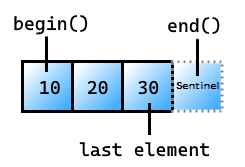common_view class (C++ Standard Library)
Take a range that may have different iterator and sentinel types and create a view that has the same iterator and sentinel type. This is useful for calling STL algorithms that accept ranges specified by iterator pairs.
Syntax
template<ranges::view V>
requires (!ranges::common_range<V> && std::copyable<ranges::iterator_t<V>>)
class common_view : public ranges::view_interface<common_view<V>>;
Template parameters
V
The type of the underlying view.
View characteristics
For a description of the following entries, see View class characteristics
| Characteristic | Description |
|---|---|
| Range adaptor | views::common |
| Underlying range | Must satisfy forward_range or higher |
| Element type | Same as the underlying range |
| View iterator category | forward_range or random_access_range when the underlying range satisfies random_access_range and sized_range |
| Sized | Only if the underlying range satisfies sized_range |
Is const-iterable |
Only if the underlying range is const iterable |
| Common range | Yes |
| Borrowed range | Only if the underlying range satisfies borrowed_range |
Members
| Member functions | Description |
|---|---|
| ConstructorsC++20 | Construct a common_view. |
baseC++20 |
Get the underlying view. |
begin C++20 |
Get an iterator to the first element in the view. |
endC++20 |
Get the sentinel at the end of the view. |
sizeC++20 |
Get the number of elements in the view. |
Inherited from view_interface |
Description |
backC++20 |
Get the last element. |
dataC++20 |
Get a pointer to the first element. |
emptyC++20 |
Test whether the view is empty. |
frontC++20 |
Get the first element. |
operator[]C++20 |
Get the element at the specified position. |
operator boolC++20 |
Test whether the view isn't empty. |
Remarks
The best way to create a common_view is by using the views::common range adaptor. Range adaptors are the intended way to create view classes. The view types are exposed in case you want to create your own custom view type.
This view is useful for passing a range that has different iterator/sentinel types to a legacy algorithm that expects them to be the same.
Requirements
Header: <ranges> (since C++20)
Namespace: std::ranges
Compiler Option: /std:c++20 or later is required.
Constructors
Create an instance of a common_view.
1) common_view() = default;
2) constexpr explicit common_view(V v);
Parameters
v
The underlying view.
For information about the template parameter type, see Template parameters.
Remarks
1) Default constructs the common_view.
2) Constructs a common_view from the underlying view using std::move(v). An error will result if V is a common range to avoid misuse that would negatively impact performance.
base
Gets a copy of the underlying view.
// Uses a copy constructor to return the underlying view
constexpr V base() const& requires std::copy_constructible<V>;
// Uses a move constructor to return the underlying view
constexpr V base() &&;
begin
Get an iterator to the first element.
constexpr auto begin();
constexpr auto begin() const requires range<const V>;
Return value
An iterator pointing at the first element in the view:

end
Get the sentinel at the end of the view.
constexpr auto end();
constexpr auto end() const requires ranges::range<const V>;
Return value
The sentinel that follows the last element in the view:

size
Get the number of elements in the view.
constexpr auto size() requires ranges::sized_range<V>;
constexpr auto size() const requires ranges::sized_range<const V>;
Parameters
None.
Return value
The number of elements in the view.